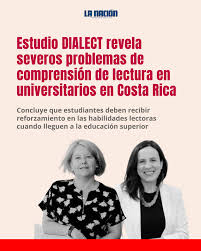
A recent diagnostic applied at Universidad Nacional (UNA) revealed serious challenges in reading comprehension among first-year students. The findings showed that most struggled to make meaning from what they read, despite having completed secondary education.
The assessment was carried out using Dialect, a digital tool developed by Pelusa Orellana, faculty member at the Human Development Lab. The test, which adapts in real time to each student’s level, measures key components of reading such as vocabulary, microstructure, and macrostructure. It has been validated across several countries in the region and is designed to offer institutions clear, individualized insights into students’ reading skills.
While many students were able to decode words, the results confirmed persistent difficulties in understanding and interpreting texts—skills essential for success in higher education. The study also pointed to the need for more sustained support during students’ academic transitions, beyond initial leveling programs.
Similar challenges have been identified in other universities across Costa Rica, both public and private, reinforcing the urgency of addressing foundational learning gaps.
The implementation of Dialect is part of a broader effort to generate data-driven strategies that strengthen reading comprehension in Latin America’s higher education systems.